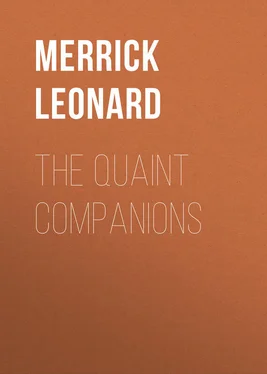Leonard Merrick - The Quaint Companions
Здесь есть возможность читать онлайн «Leonard Merrick - The Quaint Companions» — ознакомительный отрывок электронной книги совершенно бесплатно, а после прочтения отрывка купить полную версию. В некоторых случаях можно слушать аудио, скачать через торрент в формате fb2 и присутствует краткое содержание. Жанр: foreign_antique, foreign_prose, на английском языке. Описание произведения, (предисловие) а так же отзывы посетителей доступны на портале библиотеки ЛибКат.
- Название:The Quaint Companions
- Автор:
- Жанр:
- Год:неизвестен
- ISBN:нет данных
- Рейтинг книги:3 / 5. Голосов: 1
-
Избранное:Добавить в избранное
- Отзывы:
-
Ваша оценка:
- 60
- 1
- 2
- 3
- 4
- 5
The Quaint Companions: краткое содержание, описание и аннотация
Предлагаем к чтению аннотацию, описание, краткое содержание или предисловие (зависит от того, что написал сам автор книги «The Quaint Companions»). Если вы не нашли необходимую информацию о книге — напишите в комментариях, мы постараемся отыскать её.
The Quaint Companions — читать онлайн ознакомительный отрывок
Ниже представлен текст книги, разбитый по страницам. Система сохранения места последней прочитанной страницы, позволяет с удобством читать онлайн бесплатно книгу «The Quaint Companions», без необходимости каждый раз заново искать на чём Вы остановились. Поставьте закладку, и сможете в любой момент перейти на страницу, на которой закончили чтение.
Интервал:
Закладка:
"Yes," she said. She shut her eyes and let him kiss her.
CHAPTER V
And she did not repent the promise, nor did her mother's consternation have any effect upon her, other than making her lend a willing ear to Lee's entreaties for a speedy marriage. She agreed to marry him at the end of the following month. She even came to accept his kisses without shrinking much, and to offer her own in return for the jewellery that he brought her. Only once during the engagement her reflections terrified her. The thought crossed her mind that he might lose his voice. He might lose his voice and she would have done it all for nothing! He would be helpless; she would have yoked herself for life to a negro dependent on her exertions. What a future! What a hell! In the moment of alarm it even occurred to her – because she attended church punctiliously every Sunday – that the disaster would be a fitting punishment for the sin she was committing in stifling her better instincts. She was abasing herself under a temptation – she might be bowed under a burden as the result. Characteristically she ignored the fact that to afflict her husband in order to point the moral would be a shade unjust; there are many Christians who would figuratively fire the house to roast the pig, like Ho-ti in the Dissertation. And quite as many who can reconcile their interests and their conscience by judicious prayer. The name of "Vivian" figured in Ownie's prayer. She prayed for strength to act a mother's part to Vivian.
Also she determined that before she had been Lee's wife long she would persuade him to assure his life. Experience teaches; and this precautionary measure had been neglected during her first marriage. She was naturally ignorant of the negro temperament, or she would have known that there is nothing from which it is quite so averse as providing for emergencies, and that she might almost as hopefully have begged him to acquire a cream-and-roses complexion.
Meanwhile there were paragraphs in the papers; and presents were delivered from his fellow-artists, and from some of the Musical Societies; and there were presents from the Public. Even Mrs. Tremlett began to say, "It might be all for the best," now. A man who received big silver teapots from total strangers, she felt, was entitled to more respect than she had shown to him. Her grandchild and the adolescent nurse were to remain with her until the honeymoon was over. The wedding took place in London, and Ownie and Lee departed for Paris, where he was to sing.
If Mrs. Lee had kept a journal at this period, it would have been one of the most fascinating of human documents, though much of its fascination would have lain between the lines, since she inherited nothing of her father's gift for expression. It would have been the gradual diminuendo, that told the tale, the change of key. They stayed in Paris nearly five weeks, and before a fortnight had passed, the outcry in her heart was still. She was resigned. She did not acknowledge it to herself yet; that would not have been written in the diary; she did not look it; but her avaricious little soul was gratified, although her eyes claimed sympathy.
Strangers gave it to her. She was prettier still in the extravagant gowns that Lee paid for – that true loveliness unadorned is adorned the most is as silly a thing as the poet of "The Seasons" could have said – and the Englishmen and Americans in Paris spoke feelingly of "that pretty woman married to a nigger." There are women to whom pity is as sweet as noise to the masses, and Ownie Lee's abortive conscience found all the anodyne it needed in the perception that she was held a pathetic figure. The appealing smile which had always become her so well, gained in intensity. Lucretia might have worn that expression in time, if she had taken drives in the Bois instead of stabbing herself.
And Lee? Lee was intoxicated. If he had wooed her in a fool's paradise, at least the shadow of the tree of knowledge had been in it; he had had no illusions. He had not looked for passion, or for tenderness, or for understanding. It was enough for him as yet to squander devotion on indifference. He shook at the touch of the languid woman who accepted his transports with such sovereign calm. To pour out money for her adornment, to buy diamonds to flash on her fingers and her breast, was his delight. He had a contract for a six weeks' tour in England at six hundred a week, and he spent a fortnight's fees on jewels for her one morning. In the foyers and the streets, when he read the men's eyes, exultance swelled him; they envied his possession of her, these blatant fools who were consequential because they had been born with a white skin. He cursed them cheerfully in his thoughts, arrogant with power – the woman who attracted them was his wife!
Yet there was one occasion before the honeymoon ended when he seemed almost to stultify himself, when the admiration that she roused enraged him instead, and was responsible for a burst of resentment. They had met a Londoner of his acquaintance, a singer; and Lee the elated had presented him to her gaily. The singer, who was a handsome man, and not a gentleman, was too bent on being gallant to remember to be polite as he ogled her, and curled his moustache, and propped his elbows on the café table. His shoulder excluded Lee more and more; the conversation became frankly a duologue. The art of rebuffing a man without gaucherie is not known to every woman; it is, in fact, the peculiar attribute of the well-bred. Still Ownie was to blame; she regarded such impertinence as a compliment, and she made no attempt to check it with dignity or otherwise. Lee's scowl grew fiercer and fiercer, his lips bulged appallingly; and the Englishman had no sooner bowed himself away than she beheld her husband in a new light.
He rose from his chair, and put his hand on her arm. She could feel that he was trembling, but he said nothing until they had walked some steps. She turned to him, half frightened and half defiant.
"What is it?" she asked. "What's the matter with you?"
"Don't you ever speak to that fellow again," he exclaimed hoarsely. "Do you hear? I won't have it. Don't you ever dare to speak to him again. If you meet him, you're to pass him by. Is that the way you think a respectable woman ought to behave? Sitting there and – Blast him, I wish I'd thrown the glasses in his face!"
She was alarmed and angry too now. She tried to subdue him by her tone.
"Have you gone out of your mind?" she said, as steadily as she could speak. "I think you forget who it is you're talking to."
"I'm talking to you," he gasped; "I'm talking to my wife; don't you forget it either! You flirted with him, you know you did. You sat there flirting with him – and in front of your husband; you sat flirting with a skunk you'd never seen before, in front of your husband." He came to a standstill, gesticulating excitedly. "You weren't so ready with me , were you? I suppose any man may make love to you if he's white, eh? But take care – you don't know me yet. By God – "
"Hush," she said, "for Heaven's sake; the people are staring at you."
She signalled nervously to a cabman, and gave him the name of the hotel. In the cab Lee's reproaches were so furious that she drew up the windows to muffle his voice from the passers-by. The distance between the café and the hotel was short, and in less than five minutes the courtyard was reached. She sprang out, and hurried to the bedroom while he paid the fare. When he tried the door he found that she had locked it. He called to her, but she made no answer. Then he beat at the panels, and to avoid a scandal she turned the key.
"Is this going on all night?" she demanded, running to the bell-pull. "If you try to hit me, I'll ring for the manager." Her dread of receiving a blow was of the slightest – such fear of personal violence as she had known had faded during the drive – but it was the cruellest thing that she could invent to say on the spur of the moment. She clung to the bell-pull, a picture of agitation.
Читать дальшеИнтервал:
Закладка:
Похожие книги на «The Quaint Companions»
Представляем Вашему вниманию похожие книги на «The Quaint Companions» списком для выбора. Мы отобрали схожую по названию и смыслу литературу в надежде предоставить читателям больше вариантов отыскать новые, интересные, ещё непрочитанные произведения.
Обсуждение, отзывы о книге «The Quaint Companions» и просто собственные мнения читателей. Оставьте ваши комментарии, напишите, что Вы думаете о произведении, его смысле или главных героях. Укажите что конкретно понравилось, а что нет, и почему Вы так считаете.












